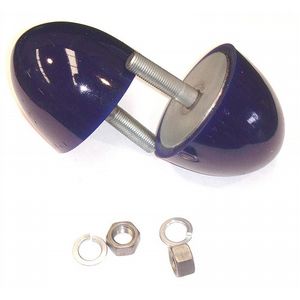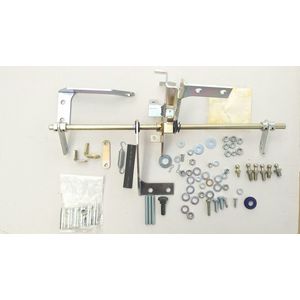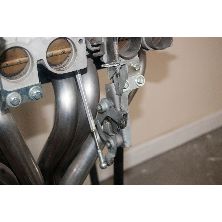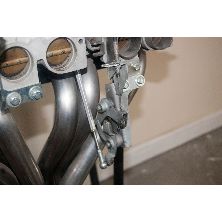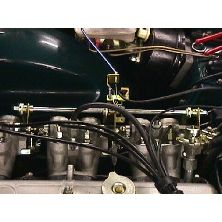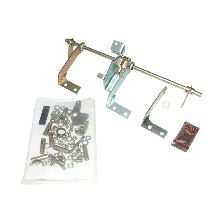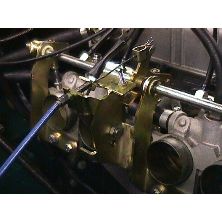- Part Detail
- CLICK TO VIEW
TRIUMPH PLATES - Browse Original Triumph Catalogue Plates
THROTTLE LINKAGE IMPROVED SINGLE TR6CR

IN STOCK This part is immediately available
Throttle improvement kit, consisting of 3 improved throttle rod assemblies, an overhead cross shaft and choke kit, which can be fitted to all cars fitted with 'CR' series TR6's and late PI saloon throttle bodies. Please make sure you have ordered the correct kit.
There are two types of throttle body and we do a different kit for each. TR5-6CP can we identified by having one balance pipe connecting all three pairs sited outboard of the injectors and each throttle spindle operated by a separate push rod. TR6CR type has 2 balance tubes connecting all three pairs, one sited outboard of the injectors and a second close to the cylinder head with each pair of throttle bodies connected together.
This overhead throttle system, which has single cable operation, has proved itself a major contributor to smooth running and maintainability of Lucas mechanical petrol injection systems.
The photos of the throttle bodies show the extent to which the throttles opened with the throttle pedal fully depressed on a car we recently fitted this kit to, prior to the kit being fitted. They clearly show that the engine was only getting as little as 30% throttle with the pedal fully depressed. With our kit fitted full throttle opening was fully restored.Suitable for use on CR TR cars and late 2.5PI replacing the original arrangement and incorporating a CP style 3 rod system which greatly improves throttle balance.
The kit includes a new overhead cross shaft mounted on sturdy pressed steel supports. This cross shaft, which runs in 3 bearings made from a material superior to the original in as much as it is not affected by heat, grease or U.V. light, is connected to the throttle butterfly spindles by three independent ball jointed rods assemblies. These new rod assemblies have been designed to eliminate inlet butterfly 'flutter' by having spring loaded ball ends and are easily adjusted to greatly improve throttle balance as the kit sits above the throttle bodies rather than below.
The original throttle mechanism on CR cars uses a double cam mechanism to try and soften the throttle action just off idle. Triumph would have found this was necessary as the high vacuum generated by the CR camshaft would tend to hold the throttles shut (with a CP type throttle mechanism which Triumph would undoubtedly have tried first) resulting in an unpleasant throttle 'snap' when coming off idle. The bad news is that the double cam arrangement when worn caused so much friction that the throttle pedal bends, often resulting in as little as half throttle with the pedal to the floor. Our throttle mechanism converts the arrangement to a CP style where each pair of throttles is operated individually and will allow full throttle to be achieved. Please note that if you have a standard CR camshaft resulting in a very high vacuum and worn throttle bodies, the 'snap action' mentioned above may be unacceptable. In our experience this does not happen with any other than the standard CR camshaft. The fitting instructions supplied with this kit give details of how to overcome this, however in instances of particularly high vacuum, we have available two supplementary kits RTR4213-1K and RTR4213-2K that reintroduce a version of the 'double cam' arrangement in between the throttle cable and the overhead kit so that you have the best of both worlds.
CP type throttle bodies are identified by having one balance tube connecting all three pairs sited outboard of the injectors.
CR type throttle bodies are identified by having two balance tubes connecting all three pairs, one sited outboard of the injectors and a second close to the cylinder head.
A full explanation of how our throttle kits work and the differences between them can be read in downloadable information sheet IS0007. See below
Note that the main photograph shows a single cable operation. A dual kit RTR4213DK is available where the second cable sits on a bracket adjacent to the main cable.

